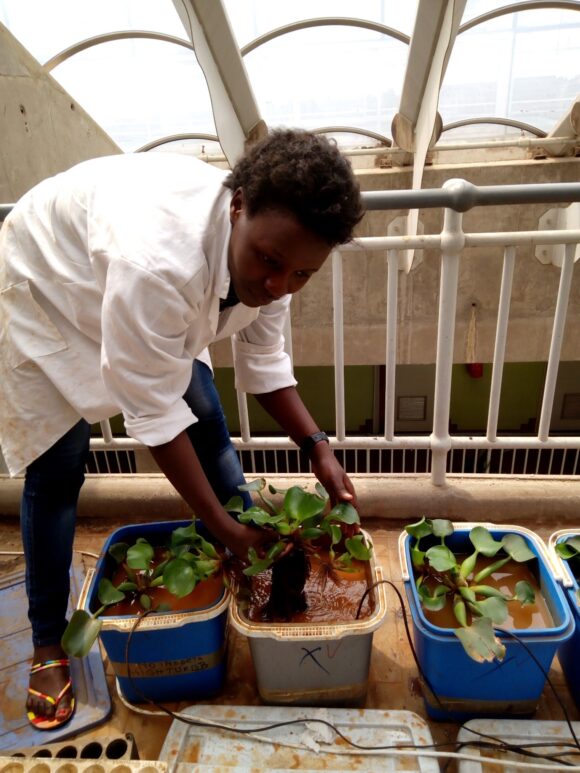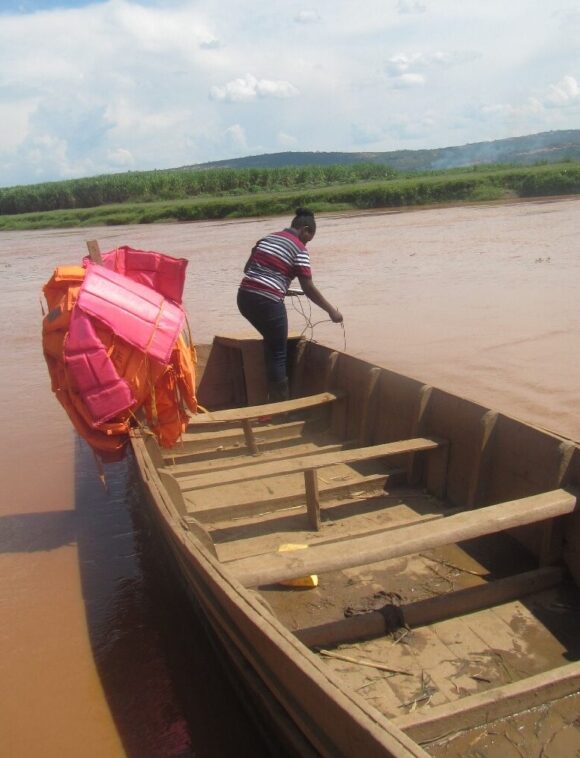A study by Dr Jeanne d’Arc Mukarugwiro in collaboration with Prof Solomon Newete from the Agricultural Research Council, Dr Florien Nsanganwimana from the University of Rwanda and C∙I∙B Core Team member Prof Marcus Byrne from the University of the Witwatersrand, identified an additional abiotic factor that constrains the success of water hyacinth’s biological control agents.
Water hyacinth (Pontederia crassipes) (C. Mart.) Solms, originally from the Amazon Basin of South America, is a notorious aquatic weed spreading into many tropical and subtropical parts of the world since the 1800s, imported largely for to its ornamental value. In Rwanda an unprecedented surge in the water hyacinth invasion compelled the government to intervene. The weed has caused a reduction of water quantity and quality and threatens the livelihoods of the local communities by disrupting fishing, boating and other socio-economic activities. The government spends a large amount of money and effort every year to reduce the impacts of water hyacinth using mechanical, chemical, or biological control methods. The latter is considered as a sustainable and environmentally friendly method. Thus, the Rwandan government released the water hyacinth weevil (Neochetina eichhorniae), one of the nine agents released to control water hyacinth globally. Despite success reported in neighbouring countries, the weevils showed no conspicuous impact on the water hyacinth invasion in Rwanda. These biological control agents are known to be constrained by abiotic factors such as water temperature and nutrients. While these may not be an issue in Rwandan waters, high water turbidity levels, particularly during the rainy season, could be detrimental to the weevils.
Jeanne d’Arc and co-authors conducted a laboratory experiment to investigate the impact of water turbidity on the reproduction and life cycle of the water hyacinth weevils and to confirm if elevated water turbidity could be responsible for the failure of the weevils to control water hyacinth in Rwandan water bodies.
The results further showed that water turbidity levels greater than 1000 Nephelometric Turbidity Units (NTU) negatively affected the development, survival and establishment of the weevils. Water hyacinth grown in high turbidity treatments gained, as opposed to losing weight, while plants from medium and low turbidity levels lost weight. Plants in high turbidity water were able to compensate for the feeding damage caused by Neochetina weevils. This means that high turbidity affects the feeding of Neochetina weevils on water hyacinth and hinders their ability to control water hyacinth infestations.
The study also revealed that the threshold levels of water turbidity beyond which the effectiveness of the water hyacinth weevils is significantly compromised, is 439.5 NTU. Thus, it is unlikely the weevils to establish in lakes and rivers with water turbidity exceeding 600 NTU.
“Water turbidity is a major contributor to the decrease in the diversity of aquatic organisms in ecosystems. It reduces light penetration and the oxygen necessary for the growth of aquatic organisms. Settled soil silts and organic matter in water smother the eggs of aquatic insects and suffocate newly hatched larvae. The weevil larvae pupate underwater on the weed’s roots where they are smothered reducing adult emergence and eventually the weevil’s population”. Thus, these findings suggest the use of Integrated Pest Management for control of water hyacinth and recommend that biocontrol practitioners measure water turbidity levels before releasing susceptible biocontrol agents,” explains Dr Jeanne Mukarugwiro.
Read the full paper
Mukarugwiro, J.A., Newete, S.W., Nsanganwimana, F.& Byrne, M.J. (2023): Water turbidity affects the establishment of Neochetina eichhorniae (Warner) (Coleoptera: Curculionidae): Implications for biological control of water hyacinth. Environmental Research, 237: 116946 https://doi.org/10.1016/j.envres.2023.116946
For more information, contact Dr Jeanne d’ Arc Mukarugwiro at janerugwiro@gmail.com or Prof Solomon Newete at NeweteS@arc.agric.za or Prof Marcus Byrne at Marcus.byrne@wits.ac.za
 |
 |
